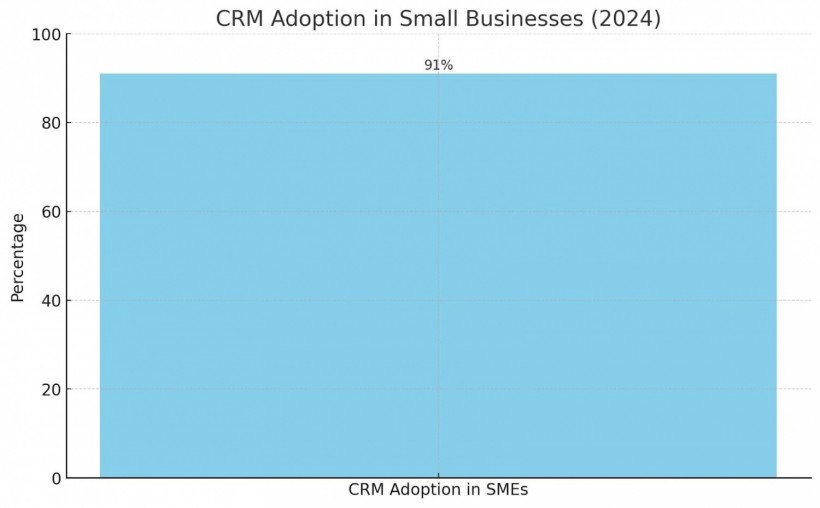
The integration of Customer Relationship Management (CRM) systems in small businesses plays a crucial role in driving innovation and growth. CRM tools go beyond mere management of customer interactions; they are key in revolutionizing how small businesses function, compete, and innovate in a fast-changing market landscape.
This introductory exploration delves into the multifaceted ways in which CRM aids small business innovation.
What is a CRM for Small Business?
A CRM (Customer Relationship Management) for small businesses refers to a software system designed to help small businesses manage and analyze customer interactions and data throughout the customer lifecycle.
The goal of such a system is to improve business relationships with customers, aid in customer retention, and drive sales growth.
With the use of a CRM or small business management software like vcita, small businesses can reap numerous benefits that contribute significantly to their growth and efficiency.
Benefits of Using a CRM for Small Business
There are various ways in which a CRM system can aid small business innovation. Some of the key benefits include:
1. Data-Driven Decision Making
CRM systems provide an abundance of data on customer interactions, sales trends, and market dynamics. This wealth of information enables small businesses to make informed, data-driven decisions.
By analyzing customer behavior and preferences, businesses can innovate in product development, service enhancements, and customer engagement strategies.
2. Tailored Customer Experiences
The insights gained from CRM tools allow businesses to create highly personalized customer experiences.
This personalization can range from customized marketing messages to bespoke product offerings, setting the business apart from competitors and driving innovation in customer engagement.
3. Streamlining Operations
CRM software automates many routine tasks, from scheduling appointments to following up on leads.
This efficiency frees up valuable resources, allowing small businesses to redirect their focus towards creative and innovative endeavors, such as developing new products or exploring new market opportunities.
4. Enhanced Collaboration and Communication
By centralizing information, CRM systems improve internal communication and collaboration. Teams can work more cohesively and effectively, sharing insights and ideas. This collaborative environment is fertile ground for innovative ideas and strategies to take shape.
5. Agile Response to Market Changes
With real-time data and analytics, small businesses can quickly adapt to market changes. This agility is key to innovation, as it allows businesses to seize new opportunities, react to emerging trends, and stay ahead of the competition.
6. Automated Customer Service
By integrating marketing automation fundamentals, automated customer service becomes not only responsive but also highly efficient. Tools that utilize algorithms and artificial intelligence can provide instant support and help resolve common inquiries, which enhances customer satisfaction.
This level of automation in customer service allows businesses to maintain consistent communication with their audience, delivering personalized assistance without the need for constant human intervention.
7. Scalability for Growth
As small businesses grow, their CRM systems can scale with them. This scalability ensures that the benefits of the CRM continue, regardless of the size of the business. It supports innovative growth strategies, from expanding into new markets to diversifying product lines.
8. Cloud CRM's Integration with Emerging Technologies
Cloud CRM systems stand out in their ability to integrate seamlessly with cutting-edge technologies like AI, machine learning, and IoT.
This synergy is particularly potent in a cloud-based environment, where the expansive and flexible nature of cloud computing enhances these integrations. Such a combination leads to innovative applications in various business aspects.
For instance, predictive analytics for sales become more robust and dynamic, leveraging the cloud's vast data processing capabilities. Automated customer service bots powered by AI are more responsive and adaptable when hosted on cloud platforms, offering real-time, scalable support.
Furthermore, the cloud CRM's proficiency in handling extensive data sets enables more in-depth market analysis, offering businesses richer insights for strategic decision-making.
Key Findings

In 2024, the prevalence of CRM (Customer Relationship Management) systems in small businesses is notably high. Research indicates that a staggering 91% of companies with over ten employees have embraced CRM solutions.
This trend highlights CRM's vital importance in the operational strategies of small and medium-sized enterprises (SMEs). CRM's role in enhancing sales and marketing processes, as well as overall business efficiency, is increasingly recognized in the SME sector.
Notable Benefits Has Been Reported from Using CRM
Small businesses have reported notable benefits from using CRM systems. For instance, there have been reports of sales increases of up to 29% attributed to the effective use of CRM.
This improvement is largely due to enhanced lead management and customer retention capabilities provided by CRM tools, which directly contribute to revenue growth.
Furthermore, CRM systems significantly improve operational efficiency in small businesses. They achieve this by automating various administrative tasks, resulting in time savings and more streamlined business operations.
- About 70% of SMB owners take on sales and marketing operations themselves.
- A significant number of SMB owners still rely on traditional methods like paper records or spreadsheets, with only 22% utilizing CRM software.
- Challenges in adopting CRM include perceived irrelevance to business size, concerns over applicability, cost, time constraints, integration difficulties, and doubts about return on investment (ROI).
- SMBs using CRM for functions such as email marketing, customer service, and contact management have reported a significant return on investment.
- There's a higher rate of complete marketing automation (42%) among SMB owners who use CRM compared to those who only use standalone marketing automation software (27%).
- A notable 70% of SMB owners who have implemented CRM express optimism about their future business prospects, a sentiment less common among those not using CRM technology.
These findings underscore the positive impact of CRM on small and medium-sized businesses, particularly in enhancing operational efficiency, marketing automation, and overall business outlook.
Conclusion
In conclusion, the role of CRM (Customer Relationship Management) systems in small businesses is transformative, playing a crucial role in driving innovation and growth.
As of 2024, an overwhelming majority of small and medium-sized enterprises (SMEs) have adopted CRM, with notable benefits including increased sales, improved operational efficiency, and enhanced customer engagement.
CRM systems empower small businesses with data-driven decision-making capabilities, enabling them to adapt quickly to market changes and customer needs.
The personalization of customer experiences, facilitated by CRM tools, not only enhances customer satisfaction but also sets businesses apart from their competitors. Additionally, the automation of routine tasks allows for the reallocation of resources towards more creative and innovative projects.
* This is a contributed article and this content does not necessarily represent the views of sciencetimes.com














